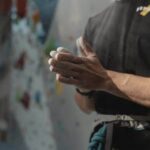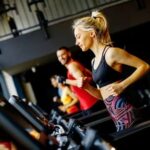Skill-related fitness is often associated with athletes who strive to excel in their respective sports. However, can others besides athletes benefit from skill-related fitness? The answer to this question is a resounding yes. Skill-related fitness encompasses various components that are not only beneficial for athletes but also for individuals in their everyday lives.
Before delving into the benefits of skill-related fitness for non-athletes, it is important to understand the concept itself. Skill-related fitness refers to a set of physical attributes that contribute to athletic performance. These attributes include agility, balance, coordination, power, reaction time, and speed. While these components are crucial for athletes to succeed in their sports endeavors, they can also enhance the overall quality of life for individuals outside the sporting realm.
Athletes extensively benefit from skill-related fitness as it directly improves their athletic performance. By honing agility, balance, coordination, power, reaction time, and speed through targeted training and practice, athletes gain a competitive edge. They are able to react swiftly on the field or court, maintain exceptional control over their body movements, and display remarkable athleticism. However, the advantages of skill-related fitness extend far beyond the boundaries of professional sports.
The benefits of skill-related fitness can be seen in various activities beyond traditional competitive sports. Whether it’s dance routines that demand precise footwork and coordination or martial arts techniques that require a combination of power and agility, skill-related fitness plays a significant role. Moreover, even mundane tasks like housework or gardening can become easier when individuals possess enhanced levels of agility and balance.
Definition of Skill-Related Fitness
Skill-related fitness refers to the physical attributes that contribute to an individual’s ability to perform specific tasks or activities efficiently and effectively. It encompasses various components, each playing a crucial role in different aspects of physical performance. The key components of skill-related fitness include agility, balance, coordination, power, reaction time, and speed.
Agility is the ability to change direction quickly and maintain control while doing so. It is essential in sports that involve rapid changes in direction, such as basketball or soccer. Balance refers to maintaining stability and equilibrium during static or dynamic movements. Good balance is important for activities like yoga, martial arts, and even everyday tasks such as standing on one foot.
Coordination involves the integration of body movements with accuracy and precision. It encompasses skills such as hand-eye coordination or foot-eye coordination seen in activities like playing tennis or dribbling a basketball. Power refers to the ability to produce maximum force in a short amount of time and is crucial for explosive movements like jumping or throwing.
Reaction time is the time it takes for an individual to respond to a stimulus. Having a quick reaction time is essential in sports where split-second decisions are required, such as baseball batting or sprinting out of the blocks in track events. Speed refers to how quickly an individual can cover a distance. Whether it be running sprints on the track or racing against opponents in team sports, speed plays a significant role.
Each component of skill-related fitness contributes differently to an individual’s overall performance abilities, both in athletic endeavors and daily life activities. Having well-developed skill-related fitness can enhance an athlete’s performance by allowing them to execute movements more efficiently and effectively.
Moreover, individuals who are not involved in competitive sports can also benefit from skill-related fitness components. Agility can help with navigating crowded spaces or avoiding obstacles while walking. Balance plays a vital role in preventing falls among older adults or during activities like hiking on uneven terrain.
Developing good coordination can improve fine motor skills useful for activities like playing a musical instrument or painting. Power and speed can come in handy in situations that require quick bursts of energy, such as carrying heavy objects or reacting to emergencies.
Understanding the different components of skill-related fitness helps individuals identify areas they may need to work on to improve their overall physical performance and abilities. By incorporating exercises or activities that target these specific components, individuals can enhance their physical capabilities, leading to better performance both in sports and everyday life activities.
How Athletes Benefit From Skill-Related Fitness
Skill-related fitness plays a crucial role in enhancing athletic performance and improving sports performance for athletes. The different components of skill-related fitness, including agility, balance, coordination, power, reaction time, and speed, contribute to an athlete’s overall physical capabilities and can make a significant difference in their competitive edge.
One key benefit of skill-related fitness for athletes is improved agility. Agility refers to an athlete’s ability to quickly change direction while maintaining control and balance. This skill is particularly important in sports that require sudden movements or rapid changes in direction, such as soccer or basketball. Athletes with better agility are able to outmaneuver their opponents more effectively, giving them an advantage on the field or court.
Another component of skill-related fitness that enhances athletic performance is power. Power refers to the ability to generate maximum force in a short amount of time. It is crucial for explosive movements like jumping, sprinting, or throwing. Athletes with greater power have the potential to jump higher, sprint faster, and deliver stronger punches or shots in their respective sports.
In addition to agility and power, coordination is another component of skill-related fitness that positively impacts athletic performance. Coordination involves the smooth integration of body movements involving multiple muscle groups to perform a specific action accurately and efficiently. Athletes with high levels of coordination have better control over their bodies during complex movements like dribbling a ball or executing intricate dance steps.
| Skill-Related Fitness Components | Benefits for Athletes |
|---|---|
| Agility | Enhances maneuverability and outmaneuvering opponents. |
| Power | Improves explosiveness in jumps, sprints, or throws. |
| Coordination | Allows for precise and efficient movements during complex actions. |
Skill-Related Fitness in Everyday Life
Skill-related fitness is not just for athletes. While it is commonly associated with sports and athletic performance, the components of skill-related fitness can benefit individuals in various aspects of everyday life. Whether you enjoy dancing, practicing martial arts, or simply engaging in daily activities like housework or gardening, skill-related fitness plays a crucial role in enhancing your performance and overall well-being.
Applications in Dance and Martial Arts
Skill-related fitness components such as agility, balance, coordination, power, reaction time, and speed are essential in activities like dance and martial arts. In dance, agility and coordination are key to executing intricate movements with precision and grace. Balance plays a vital role in maintaining stability while performing various dance routines.
Additionally, power and speed contribute to dynamic leaps and turns. Similarly, martial artists rely on these skill-related fitness components to deliver swift strikes, maintain balance during complex movements, and react quickly to their opponent’s actions.
Benefits in Daily Tasks
Even everyday tasks like housework or gardening require skill-related fitness. For instance, balance is crucial when reaching high shelves or climbing ladders while cleaning or organizing your home. Coordination and agility become essential when maneuvering through narrow spaces or avoiding obstacles while performing chores.
Similarly, power and endurance play a role when carrying heavy objects or engaging in physically demanding gardening activities. By incorporating skill-related fitness into these tasks, individuals can increase efficiency while reducing the risk of accidents or injuries.
Gaining Transferable Skills
Practicing skill-related fitness outside of traditional sports settings also provides individuals with transferable skills that can be applied to various situations. Improved coordination and motor skills gained through dance or martial arts training can enhance an individual’s ability to perform other physical activities requiring precision and control. These transferable skills also extend beyond physical performance by improving cognitive functions related to attention span, memory retention, and problem-solving abilities.
Enhanced Motor Skills and Coordination
Skill-related fitness not only benefits athletes but also individuals in their everyday life. One of the key advantages of skill-related fitness is its ability to enhance motor skills and coordination, making individuals more adept at tasks that require precision and control. By focusing on agility, balance, coordination, power, reaction time, and speed, individuals can develop better control over their body movements.
Improving motor skills and coordination has practical applications in various activities outside of sports. For example, dancers rely heavily on precise movements and coordination to perform complex routines. By incorporating skill-related fitness exercises into their training, dancers can improve their ability to execute intricate footwork or maintain balance during challenging poses.
In addition to dancers, martial artists also benefit from enhanced motor skills and coordination. The fluidity of movements required in martial arts forms like Taekwondo or Karate demand a high level of control over one’s body. Incorporating skill-related fitness exercises allows martial artists to develop this control by improving their balance, flexibility, and overall body awareness.
Even daily tasks such as housework or gardening can be made easier with improved motor skills and coordination. These activities often involve precise movements that require a certain level of control over the body. By practicing skill-related fitness exercises regularly, individuals can enhance their motor skills and coordination, making such tasks more efficient and less prone to accidents.
| Enhanced Motor Skills | Improved Coordination |
|---|---|
| Skill-related fitness exercises help develop better control over body movements. | Precise movements in activities like dancing or martial arts require high levels of coordination. |
| Dancers can improve footwork and maintain balance during complex routines. | Martial artists can enhance their body awareness and fluidity of movements. |
| Regular practice of skill-related fitness exercises makes daily tasks like housework or gardening more efficient and safe. | Improved motor skills and coordination lead to better control in daily activities beyond sports. |
Injury Prevention
Skill-related fitness not only enhances athletic performance but also plays a crucial role in injury prevention. By improving flexibility, balance, and coordination, skill-related fitness helps reduce the risk of accidents both in sporting and non-sporting activities.
Flexibility is an important component of skill-related fitness that can help prevent injuries. Regular stretching exercises can increase the range of motion in joints, allowing for better movement and reducing the risk of strains or sprains. Flexibility exercises such as yoga or Pilates can also improve posture, which in turn helps alleviate strain on muscles and joints.
Balance is another key aspect that skill-related fitness targets to prevent injuries. It involves the ability to maintain equilibrium while performing tasks or movements. By practicing balance exercises, individuals develop better proprioception (awareness and control of one’s body position). This leads to improved stability and reduces the likelihood of falls or other accidents both during physical activities and everyday tasks.
Coordination is closely related to both flexibility and balance when it comes to preventing injuries. It refers to the harmonious interaction between different parts of the body to execute movements accurately and efficiently. Skill-related fitness training incorporates exercises that challenge coordination skills, such as ladder drills or agility ladder exercises. These activities improve neuromuscular control, ensuring that muscles activate in a coordinated manner, reducing the risk of missteps or accidents.
In summary, skill-related fitness has a significant role in injury prevention by improving flexibility, balance, and coordination. Incorporating stretching exercises for flexibility, practicing balance training activities like yoga or Pilates, and engaging in coordination drills will not only enhance athletic performance but also reduce the risk of accidents during sports or everyday activities. By focusing on these aspects of fitness, individuals can maintain their physical well-being while enjoying an active lifestyle with reduced risks of injury.
Mental Benefits
Skill-related fitness not only enhances physical performance but also offers numerous mental benefits. Engaging in skill-related fitness activities can lead to increased self-confidence, improved focus, and enhanced concentration abilities. These psychological benefits are applicable to both athletes and non-athletes, making skill-related fitness a valuable component of any fitness routine.
One of the major mental benefits of skill-related fitness is increased self-confidence. As individuals improve their agility, coordination, power, reaction time, and speed through regular practice, they develop a sense of accomplishment and belief in their own abilities. This boost in confidence can have a positive impact on various aspects of life, including sports performance, social interactions, and personal achievements.
In addition to self-confidence, skill-related fitness can also enhance focus and concentration abilities. Many skill-related activities require individuals to concentrate on specific movements or tasks while blocking out distractions.
For example, dancers need to focus on their body positions and movements in order to execute complex routines with precision. By practicing skill-related fitness regularly, individuals can improve their ability to stay focused and be present in the moment, leading to better performance not only in physical activities but also in everyday tasks that require concentration.
Moreover, engaging in skill-related fitness activities can help reduce stress levels by providing an outlet for mental relaxation. When individuals immerse themselves in these activities that require precision and control, they often enter a state of flow where they are fully focused on what they are doing – allowing them to temporarily detach from everyday worries or concerns. This mental rejuvenation can contribute to overall well-being and promote better mental health.
Skill-Related Fitness for Seniors
As individuals age, maintaining physical fitness becomes increasingly important for overall health and well-being. While traditional forms of exercise such as strength training and cardiovascular exercise are often emphasized for seniors, skill-related fitness is also crucial for the aging population.
Skill-related fitness refers to the components of physical fitness that contribute to an individual’s ability to perform skilled movements efficiently. In this section, we will discuss the relevance of skill-related fitness for seniors and highlight how it can improve balance, prevent falls, and enhance cognitive skills in older adults.
One key area where skill-related fitness is beneficial for seniors is in improving balance. As people age, their balance tends to decline, making them more susceptible to falls. However, practicing activities that target balance as a component of skill-related fitness can help older adults maintain or even improve their balance abilities.
This includes exercises such as Tai Chi or yoga that focus on stability and body awareness. By enhancing their balance through skill-related fitness training, seniors can reduce their risk of falls and associated injuries.
In addition to improved balance, skill-related fitness can also positively impact cognitive skills in older adults. Research has shown that engaging in activities that require coordination and quick decision-making can help keep the mind sharp and enhance cognitive abilities such as memory and attention span. By incorporating elements of skill-related fitness into their routine, seniors can challenge themselves mentally while reaping the physical benefits.
Ultimately, skill-related fitness is not limited to athletes but can be advantageous for individuals of all ages and abilities. For seniors specifically, it offers unique advantages such as improved balance, fall prevention, and enhanced cognitive skills.
It is important for older adults to consult with a healthcare professional or trained instructor before engaging in any new exercise program to ensure safety and suitability for individual needs. By considering skill-related fitness as part of their overall wellness plan, seniors can reap the numerous benefits it offers for both body and mind.
Conclusion
In conclusion, skill-related fitness offers a wide range of benefits not only for athletes but also for non-athletes in their everyday lives. By improving agility, balance, coordination, power, reaction time, and speed, individuals can enhance their athletic performance and excel in various sports activities. However, the advantages of skill-related fitness extend beyond the realm of sports and have practical applications in different aspects of life.
Engaging in skill-related fitness exercises such as dancing, martial arts, and even routine tasks like housework or gardening can boost motor skills and coordination. These improvements allow individuals to perform tasks that require precision and control with greater ease and accuracy. Moreover, practicing skill-related fitness helps prevent injuries by enhancing flexibility, balance, and coordination, reducing the risk of accidents both on and off the field.
It is important to acknowledge the mental benefits that come with skill-related fitness as well. Increased self-confidence, improved focus, and enhanced concentration abilities are just some of the psychological advantages that individuals can experience through regular training. Additionally, skill-related fitness holds great relevance for seniors as it improves balance, prevents falls, and enhances cognitive skills in older adults.
Incorporating skill-related fitness into one’s overall fitness routine is essential for maximizing potential in both athletic pursuits and everyday activities. Regardless of whether you are an athlete or a non-athlete seeking to improve your overall well-being, focusing on agility, balance, coordination, power, reaction time,and speed will undoubtedly yield numerous physical benefits along with positive psychological outcomes.
So why limit the benefits of skill-related fitness to athletes alone when everyone has so much to gain? Start incorporating these components into your own fitness routine today for a healthier body and mind.
Frequently Asked Questions
Can Others Besides Athletes Benefit From Skill Fitness Why?
Yes, others besides athletes can benefit from skill fitness. Skill fitness involves practicing and developing specific skills that can be useful in various aspects of life. For example, communication skills, problem-solving skills, and leadership skills are all important in many professional settings.
By focusing on skill fitness, individuals can enhance their abilities and increase their chances of success in their careers and personal lives. Additionally, skill fitness can also improve cognitive abilities such as memory, focus, and decision-making skills, which can be beneficial for anyone regardless of their profession or lifestyle. Overall, skill fitness is not limited to athletes but can be advantageous for anyone looking to improve their overall performance and achieve their goals in different areas of life.

Passionate about providing useful information to anyone with an interest in the field of Personal Training, I strive to pass on to our readers quality information and to answer any questions about Personal Trainers, the work they do and how to become one.





